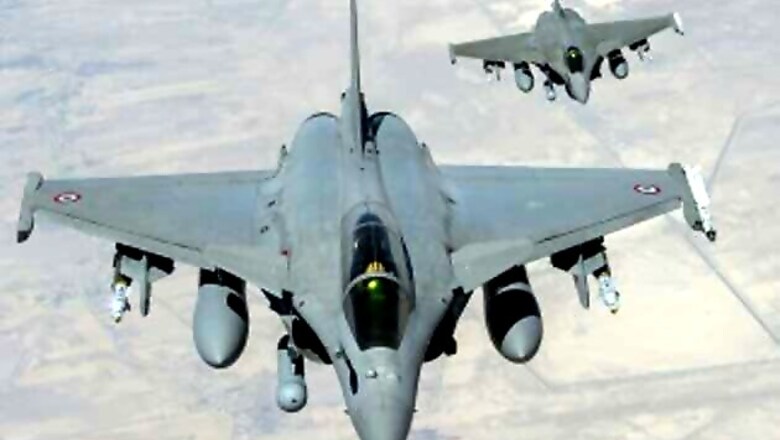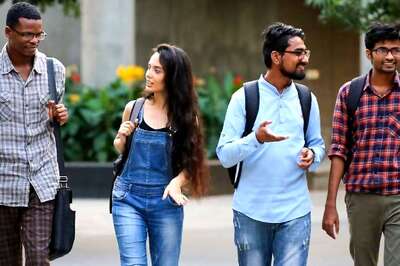
views
Baghdad: President Francois Hollande said Rafale jets hit "a logistics depot of the terrorists" near the city of Mosul, which has been held by Islamic State for more than three months. It promised more operations in coming days.
The French military action, which follows US air strikes in northern Iraq and near the capital Baghdad, appeared to win qualified endorsement from Iraq's top Shiite leader Grand Ayatollah Ali al-Sistani.
In a Friday sermon, delivered by one of his aides, the elderly cleric acknowledged Iraq needed foreign help but said Iraq must not become subservient to outside powers.
"Even if Iraq is in need of help from its brothers and friends in fighting black terrorism, maintaining the sovereignty and independence of its decisions is of the highest importance," Sistani's spokesman Sheikh Abdul Mehdi Karbala'i said.
Sistani speaks for millions of Iraq's majority Shiites and has a worldwide following.
Islamic State fighters, who have controlled much of Syria's eastern oil and agricultural provinces for more than a year, swept through mainly Sunni Muslim regions of north Iraq in mid-June, seizing cities including Mosul and Tikrit and halting only a few dozen miles (km) north of the capital Baghdad.
Iraq's army and Shi'ite militia forces have battled the Islamic State and other Sunni militants, but failed to make significant territorial gains.
Car bombs, some of them claimed by Islamic State, have been a near daily occurrence in the capital. On Friday, two car bombs killed nine people in Baghdad and a bomb in the majority Kurdish city of Kirkuk in the north killed eight people, security sources said.
Washington launched air strikes for the first time in August to halt an IS advance on the Kurdish autonomous capital Arbil. Since then it has tried to build an international coalition to destroy the radical Sunni Muslim group, saying more than 40 countries, including Arab nations, have offered assistance.
The air strikes have helped Kurds claw back lost territory. This week they retook ground in the northern province of Nineveh including villages in the Khazer area and several others further west around the town of Zummar, which remains under IS control.
Elsewhere in Nineveh, Islamic State offered another sign of its growing authority over Iraqis, creating a police force "to implement the orders of the religious judiciary" , according to a well-known militant Islamist website.
French officials said Friday's mission involved two Rafale fighter jets, a supply plane and a Navy reconnaissance plane. Four air strikes were carried out in the space of half an hour, destroying a storage facility containing vehicles, arms and fuel, a spokesman for Defense Minister Jean-Yves LeDrian said.
Hollande has said French military action would be limited to Iraq and no ground troops would be sent.
Kurdish exodus
In neighboring Syria, Western powers are more reluctant to launch military strikes which could be seen to bolster President Bashar al-Assad after they repeatedly called for his departure over his military response to popular protests in 2011.
But US President Barack Obama said last week he had authorized air strikes in Syria too and would not hesitate to take action, although he also stressed plans to arm "moderate" Syrian rebel fighters to help them take on Islamic State.
Exploiting the security vacuum in the north of the country, Islamic State fighters have expanded their reach, attacking mainly Kurdish villages near the border with Turkey over the last two days, driving out a wave of refugees.
Several thousand Syrian Kurds began crossing into Turkey on Friday, fleeing IS fighters who are besieging the mainly Kurdish town of Ayn al-Arab, known as Kobani in Kurdish.
Turkey is already sheltering more than 1.3 million Syrian refugees and fears hundreds of thousands more, waiting in the mountains on the Syrian side of the 900-km (560-mile) border, could seek to cross as fighting escalates.
The Syrian Observatory for Human Rights, which tracks developments in the civil war, said on Friday IS had seized three more villages near Kobani, bringing to 24 the number it has taken.
The attack on Kobani prompted a Kurdish militant call to the youth of Turkey's mainly Kurdish southeast to join the fight against IS and came days after the US military said the help of Syrian Kurds would be needed against the Islamist militants.
The president of Iraq's Kurdistan region also called for international action. "I call on the international community to use every means as soon as possible to protect Kobani," President Masoud Barzani said.



















Comments
0 comment